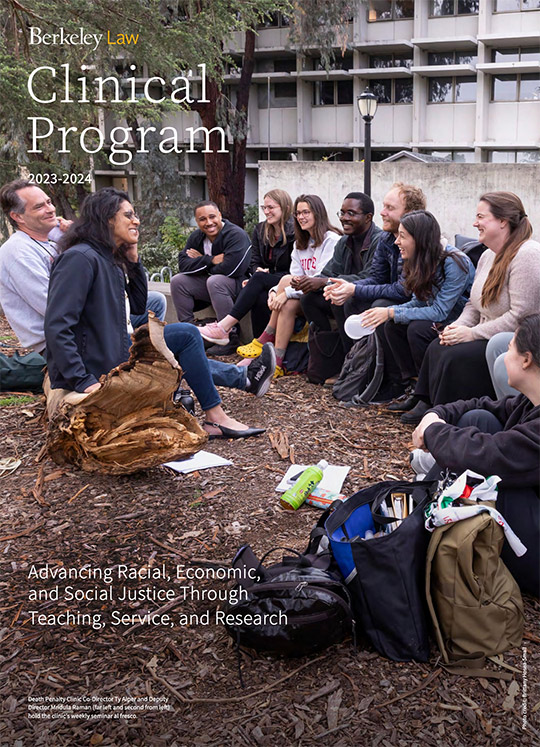 The Berkeley Law Clinical Program’s mission of advancing racial, economic, and social justice continues to drive our work. Last year, 225 students enrolled in our 14 clinics, collaborating with faculty, staff, and clients to advance justice in the East Bay, nationally, and globally.
The Berkeley Law Clinical Program’s mission of advancing racial, economic, and social justice continues to drive our work. Last year, 225 students enrolled in our 14 clinics, collaborating with faculty, staff, and clients to advance justice in the East Bay, nationally, and globally.
Recently, clinic students helped file a lawsuit concerning radioactive contamination at Hunters Point Naval Shipyard, a site slated for development; advocated for clients facing execution in Alabama, Arizona, Kansas, and California; filed an amicus brief in Mexico’s Supreme Court defending the rights of asylum seekers; successfully petitioned California courts to remove copyright restrictions from official jury instructions; persuaded the city of Berkeley to pursue an affordable housing policy to help residents secure housing and avoid displacement; and supported a successful bill to abolish juvenile fees and fines in Washington, while working on implementing signed legislation in Arizona, Illinois, and Texas.
The Clinical Program organized events to inspire, support, and train students and partners. East Bay Community Law Center Executive Director Zoë Polk led a conversation with civil rights attorney and poet Sunu Chandy about advancing justice through law and art. The Human Rights Clinic co-hosted the first annual conference for U.S. prosecutors on how to prosecute police who use excessive force. Clinic students had the opportunity to hear from Ukrainian clinicians about working in a time of war; speak with a Ninth Circuit judge about the connection between clinic experience and clerkships; and gather for an end-of-year celebration to acknowledge the effort and impact of their collective work.
Our clinical faculty published reports, podcast episodes, and articles to elevate awareness around juror demographics, pretrial incarceration, alternative schools, author protections, and more. In its report, “Guess Who’s Coming to Jury Duty? How the Failure to Collect Juror Demographic Data Contributes to Whitewashing the Jury Box,” the Death Penalty Clinic continued its racial justice research and advocacy by cataloging and analyzing whether, and how, states gather prospective jurors’ self-identified race and ethnicity. The Policy Advocacy Clinic evaluated how counties are implementing a 2021 California Supreme Court ruling that setting unaffordable bail is unconstitutional in ”Largely Unchanged: The Limits of In re Humphrey’s Impact on Pretrial Incarceration in California.” The Samuelson Law, Technology & Public Policy Clinic collaborated on “Writing About Real People,” a guide for nonfiction authors addressing defamation, privacy, and right-of-publicity issues.
Nationally, first-year law students have few opportunities to engage in client-facing work in a clinic setting. The program is excited to expand its offerings with new opportunities that will introduce 1Ls to social justice practice through the teaching and practice expertise of clinical faculty. In spring 2025, Laurel Fletcher will launch the new Global Rights Innovation Lab Clinic and the Policy Advocacy Clinic will begin a new clinical offering — both specifically designed for 1Ls.
We are proud of the work our students, faculty, staff, and partners accomplished this past year and exhilarated by the possibilities that lie ahead. Thank you to all who contributed to our students’ growth, client work, and overall impact.
In community,
Ty Alper, faculty co-director, Clinical Program
Roxanna Altholz, faculty co-director, Clinical Program
Rosa Bay, co-deputy director, East Bay Community Law Center
Laura Riley, director, Clinical Program